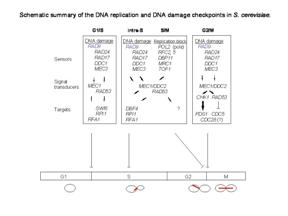
Checkpoints are mechanisms that impose delays in the cell cycle in response to DNA damage or defects in DNA replication, to ensure that mitotic transmission is error-free. Failure to delay the cell cycle in the presence of damage converts an easily reparable DNA lesion into one far more deleterious, provoking genomic instability or cell death. This figure shows a summary of our current knowledge about the DNA damage checkpoints in yeast. Genetic analysis of the pathway has allowed classification of its components into Sensors, which detect different sorts of damage, Signal transducers which are signal-integrating kinases, and Targets which carry out the essential functions of suppressing progress through the cell cycle (i.e. inducing repair genes and preventing late origin firing or sister chromatid segregation. Contributed by C. Frei and K. Shimada, laboratory of S. Gasser, U. Geneva.
